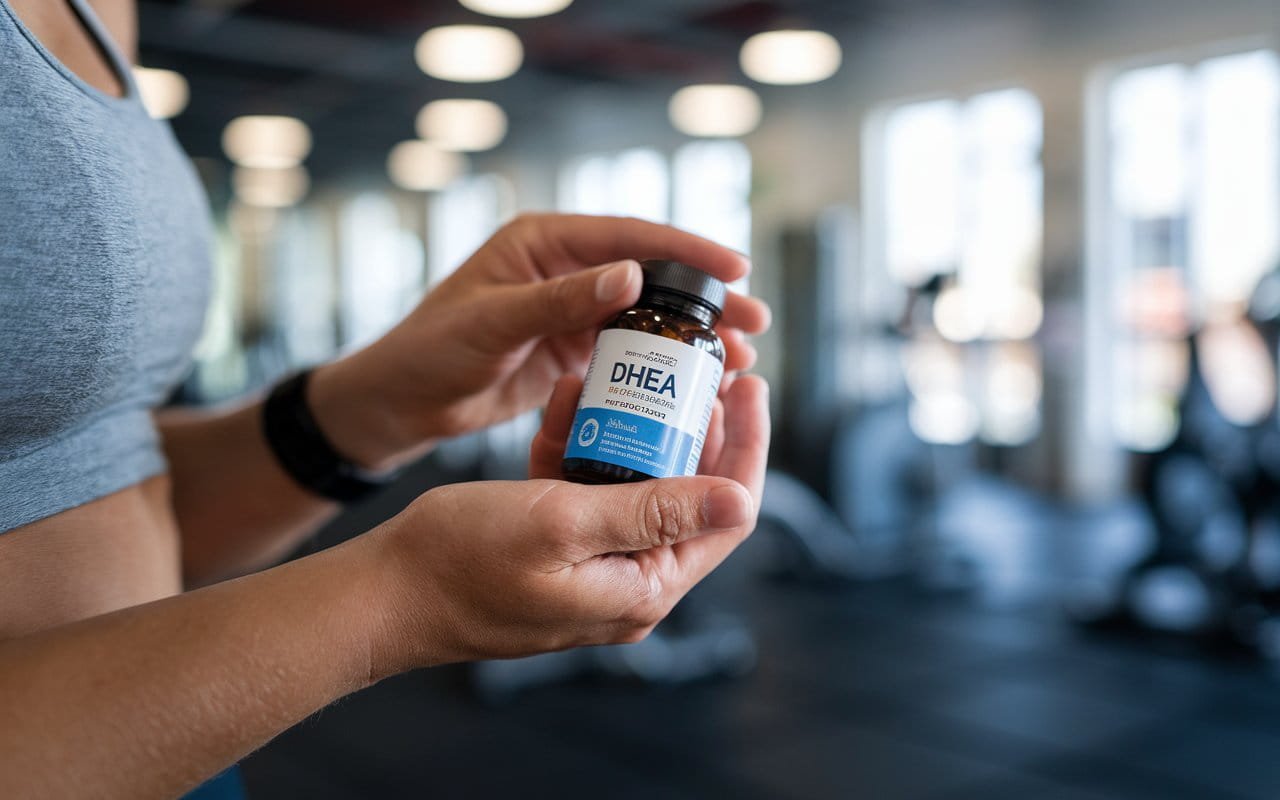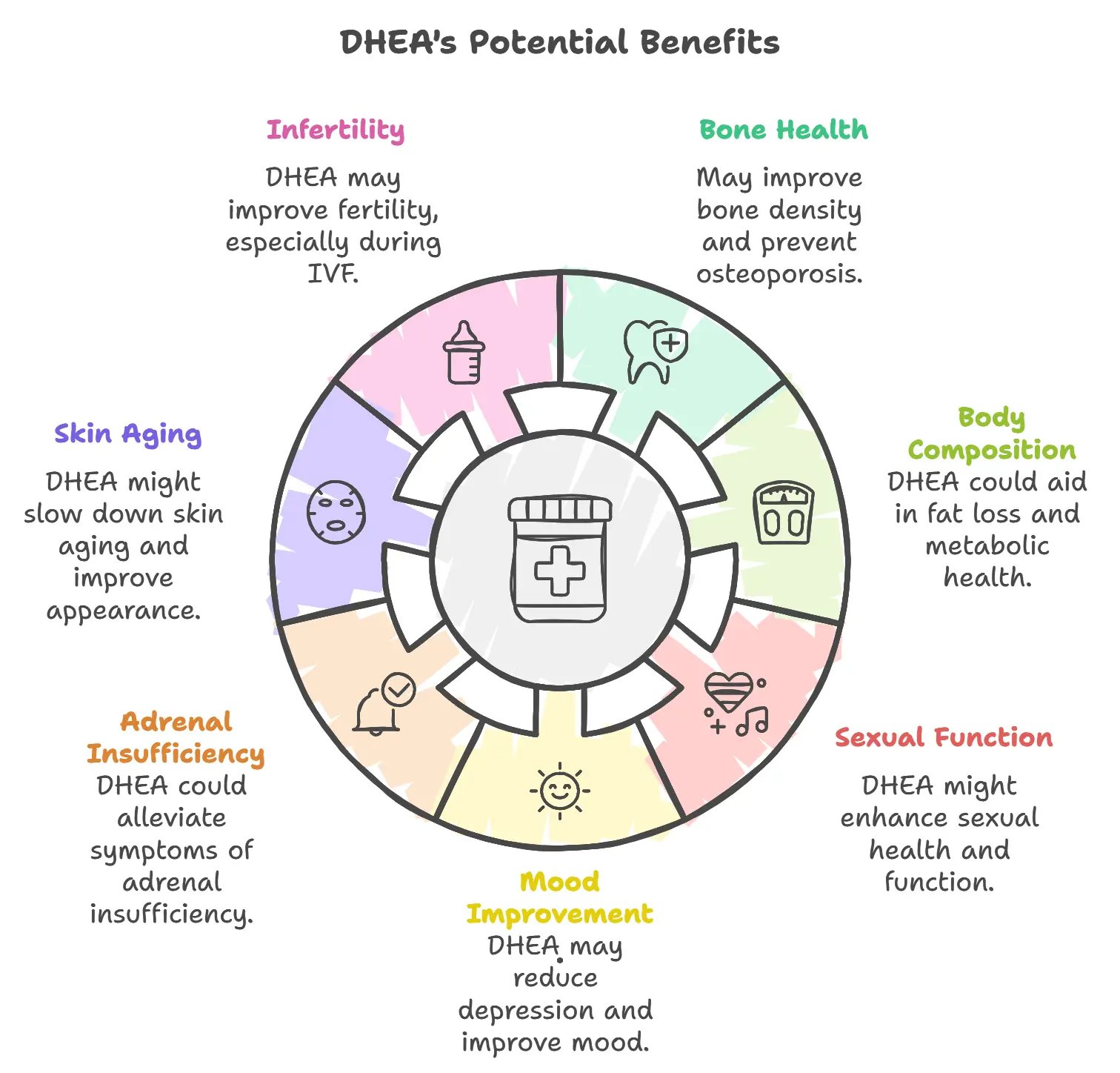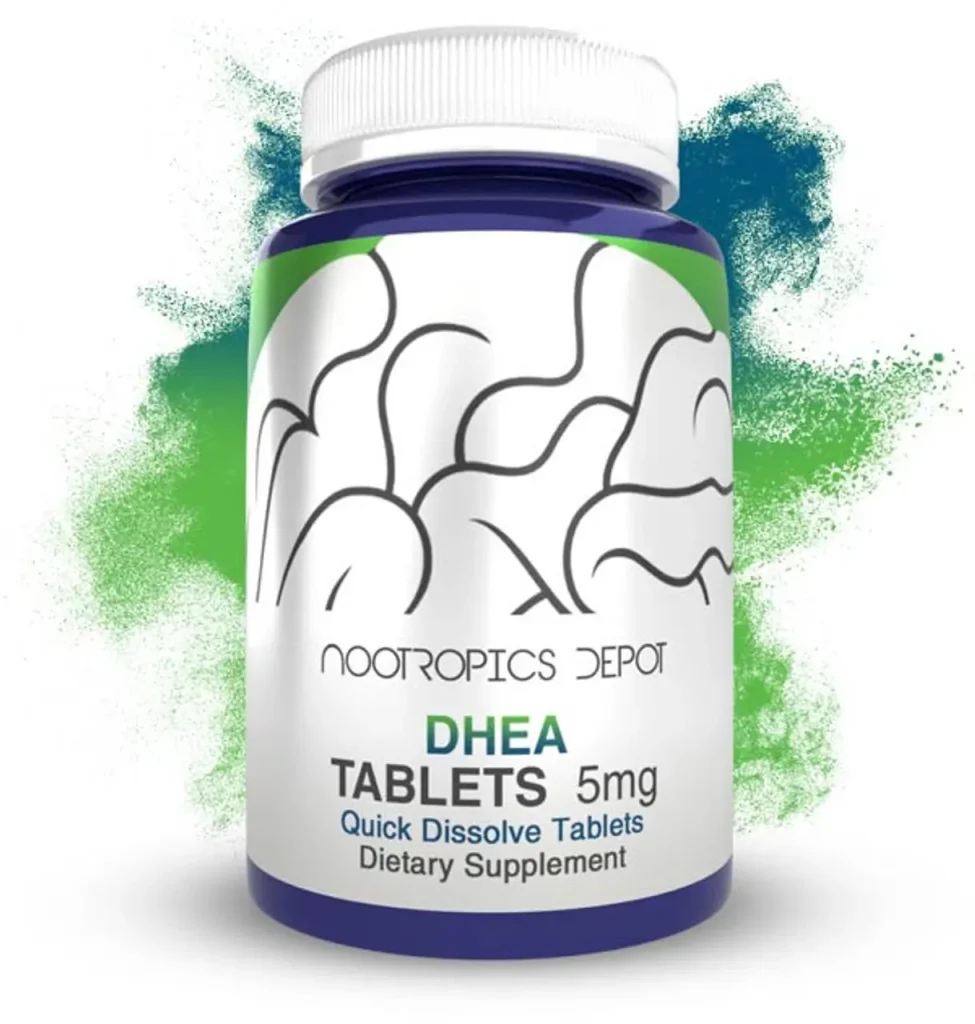What Is Dehydroisoandrosterone (DHEA), Benefits, Uses and Potential Side Effects
More than a mere hormone, DHEA could improve your health and vitality, but understanding its potential side effects is crucial.

DHEA, or Dehydroisoandrosterone, is a hormone produced by the adrenal glands that acts as a precursor to testosterone and estrogen.
It’s linked to improving bone density, body composition, sexual function, and mood, particularly as you age and your natural levels decline. It might also help with adrenal insufficiency and skin aging.
However, you should be aware of potential side effects like oily skin, acne, or more serious issues such as interactions with certain medications.
What is Dehydroisoandrosterone (DHEA)?
Dehydroepiandrosterone (DHEA) is a natural hormone made mainly by your adrenal glands, but also in smaller amounts by your gonads and brain.
It’s an important part of making other hormones, starting with cholesterol and eventually producing testosterone. DHEA is one of the most common steroids in humans and acts as a building block for major sex hormones like testosterone and estrogen.
Your DHEA levels are highest around age 25 but decrease as you get older. At the time you become 70 – 80 yearls old, your DHEA levels are 10% to 20% of what they were when you were young. [1]
This drop has led people to think about using DHEA supplements to fight aging and improve health.
However, while DHEA is needed to make sex hormones, scientists are still studying its exact roles and benefits. We know that DHEA is important for keeping your hormones balanced, but we don’t yet fully understand how it affects health and aging.
Dehydroisoandrosterone’s Benefits & Uses
DHEA offers several potential benefits, including improved bone density and reduced risk of osteoporosis.

1. Bone Density and Osteoporosis
One of the possible benefits of DHEA is its ability to improve bone strength, which can help prevent osteoporosis, especially in older people.
As you get older, your body makes less DHEA, and this may lead to weaker bones and a higher chance of fractures. Some studies suggest that taking DHEA supplements could slow down this process and help keep your bones healthier.
For example, this Mendelian randomization study found that higher levels of DHEAS in women are linked to stronger bones and fewer forearm fractures.
Another study suggests that daily 50 mg DHEA supplementation has a modest beneficial effect on bone mineral density and bone resorption in women, but provides no bone benefit for men in older healthy adults.
This 2012 study found that DHEA supplements improved bone density and hormone levels in postmenopausal women with steroid-induced osteoporosis who couldn’t tolerate bisphosphonates.
Finally, a 2020 Literature Review concluded that DHEA may increase bone mineral density and may play a role in osteoporosis treatment by increasing osteoblast activity and IGF-1 expression. (IGF-1 stands for Insulin-like Growth Factor 1. It is a protein that is very important for growth and development in our bodies. )
However, it’s important to remember that research on DHEA’s impact on bone strength shows mixed results. While some studies have found positive effects, others haven’t seen much improvement.
Things like the amount of DHEA taken, how long it’s used, and individual differences can affect how well DHEA works for bone health.
Keep in mind that eating foods for bone health, doing regular weight-bearing exercises, and other healthy habits can help you keep strong bones as you get older.
2. Body Composition and Metabolic Health
As you get older, keeping a healthy body and good metabolism becomes really important. As I mentioned earlier, DHEA naturally goes down as you age, and it seems to help with both of these things (Body Composition and Metabolic Health), especially for older people.
Some studies say that taking DHEA might help reduce body fat, but regular DHEA supplements usually don’t help much with fat loss.
For example, in animals like dogs and rats, DHEA led to weight loss and reduced body fat when combined with a low fat diet. [2]
When it comes to humans, DHEA reduced abdominal fat and improved insulin action in elderly people. [3]
On the other hand, it didn’t make a big difference in body weight for morbidly obese adolescents. [4]
Interestingly, a meta-analysis showed that while DHEA increased lean body mass and decreased fat mass, it didn’t affect overall body weight or BMI.
Check Also: Full Body Analysis Calculator
So, while there are some positive findings, the overall impact of DHEA on fat loss seems to be limited.
However, there’s a different type called 7-Keto DHEA that might work better.
7-Keto-DHEA is marketed for weight loss, and a review of studies found 4 out of 686 that met criteria, showing some weight loss benefits and no serious side effects, but more research is needed for clear conclusions.
Even though we need more research to really understand how DHEA affects body and metabolism, the evidence we’ve now suggests it could help people age in a healthier way.

3. Sexual Function
Sexual health can often get worse as you get older, but DHEA might help.
DHEA supplements can improve your sexual function, especially if you’re a woman having problems in this area.
The way it works is that DHEA can be converted into androgens and estrogens directly in tissues, which helps improve sexual function. It also affects the production of neurosteroids and endorphins, boosting sexual drive and behavior. [5]
Studies have shown that DHEA supplements significantly improve sexual function in women with Sheehan syndrome and postmenopausal women. This includes better scores in areas like desire, arousal, lubrication, orgasm, satisfaction, and pain reduction. [6] [7]
Plus, DHEA has been shown to improve sexual function and increase the frequency of sexual intercourse in early postmenopausal women. These improvements are significant compared to placebo or other treatments like vitamin D.
Even though DHEA isn’t a complete fix for sexual problems, it can help with certain issues related to sexual health. If you’re having trouble with sexual function, especially as you get older, it might be a good idea to think about whether DHEA could help improve your overall happiness.
4. Depression and Mood
There’s some promising evidence that DHEA might help reduce symptoms of depression. For example:
- In a 1999 study published in the American Journal of Psychiatry, 22 patients with major depression were given either DHEA or a placebo for 6 weeks. The study found that those taking DHEA had a greater decrease in depressive symptoms compared to the placebo group. Specifically, five out of 11 patients on DHEA showed a 50% reduction in symptoms, whereas none in the placebo group did.
- A 2018 systematic review and meta-analysis published in Current Pharmaceutical Design evaluated the effectiveness of DHEA in treating depression. The review concluded that DHEA was more effective than placebo in reducing depressive symptoms, suggesting that DHEA could be a viable treatment option for depression.
- Another systematic review from 2014 in Current Pharmaceutical Design looked at DHEA’s effects on depression and depressive symptoms in various conditions. The review found significant improvements in patients with major depression, schizophrenia, anorexia nervosa, HIV, and adrenal insufficiency.
- A 2006 placebo-controlled trial published in the American Journal of Psychiatry focused on HIV-positive adults with subsyndromal depression. This study included 145 patients and found that those taking DHEA had significantly greater improvements in depressive symptoms compared to those on placebo. The response rate for the DHEA group was 56% compared to 31% for the placebo group.
- Finally, a 2020 systematic review and meta-analysis published in the Journal of Neuroscience Research included data from 15 studies with 853 participants. It found that DHEA significantly improved depressive symptoms compared to placebo, although the evidence quality was considered very low. The side effects were generally mild and related to androgynous features.
The way DHEA might work is by enhancing the neurotransmission of noradrenaline and serotonin, which are brain chemicals that influence mood. It also has antiglucocorticoid effects that can improve cognitive function. Additionally, DHEA may activate the sigma 1 receptor, boosting neurotransmitter activity and contributing to its antidepressant properties. [8]
It’s very important to talk to a doctor before using DHEA for depression, as it can interact with other medications and mightn’t be safe for everyone.
5. Adrenal Insufficiency
DHEA has shown promise in helping people with adrenal insufficiency, a condition where the adrenal glands don’t make enough hormones. Studies suggest that taking DHEA supplements can improve quality of life, energy levels, mood, and sexual function for those with this condition.
For example, DHEA supplementation has been found to provide a small improvement in health-related quality of life (HRQOL) and reduce depression in women with adrenal insufficiency. However, its effects on anxiety and sexual well-being were not significant.
Interestingly, DHEA supplementation was found to restores serum levels of DHEA and its sulfate (DHEAS) to baseline levels. In some cases, it even increases levels of other androgens such as testosterone and androstenedione. This hormonal balance can be particularly beneficial for those with adrenal insufficiency.
Moreover, DHEA treatment has been associated with an increase in bone mineral density at specific sites and improvements in lean body mass. This is especially important because maintaining bone health and muscle mass can be challenging for those with adrenal insufficiency.
As mentioned earlier, DHEA has also been reported to increase sexual interest and satisfaction in women with adrenal insufficiency.
If you have adrenal insufficiency, DHEA might be a treatment option to consider. By taking DHEA, you may be able to increase some of the hormones that are usually low in adrenal insufficiency, which could make you feel better overall.
6. Skin Aging

Studies have been done on DHEA’s effects on skin aging with promising results. Researchers have looked at both topical and oral DHEA to improve skin conditions related to aging.
For example, topical DHEA boosts sebum production, which is helpful for post-menopausal women who often have lower sebum levels. [9]
Oral DHEA also improves skin hydration and sebum production, making skin better in older people. [10] [11]
DHEA is important for collagen too. It increases procollagen synthesis and stops collagen from breaking down by reducing matrix metalloproteinases (MMP-1) and increasing tissue inhibitors of matrix metalloprotease (TIMP-1). Topical DHEA even enhances collagen genes and improves the structure of the dermis. [12]
When it comes to skin appearance and thickness, topical DHEA makes skin brighter, reduces the papery look, and fights epidermal thinning. Oral DHEA can also make the epidermis thicker and improve skin color. [13]
Moreover, DHEA speeds up wound healing by boosting matrix deposition and lowering inflammation, probably because it converts to estrogen locally. [14]
Related: 5 Science-Backed Supplement for Anti Aging Skin: What Really Works
7. Infertility
Infertility can be a tough road for many couples, and DHEA supplements might offer some hope. If you’re doing in-vitro fertilization (IVF), DHEA could be especially helpful.
Recent studies suggest that DHEA supplements might improve how your ovaries work, making it more likely for you to get pregnant. DHEA is believed to improve the quality of your eggs and might even help you produce more eggs during IVF.
This is important because the more eggs you have, the better your chances of fertilization and embryo development. While more research is needed to fully understand how DHEA helps with fertility treatments, current evidence shows it could be a useful supplement for women dealing with infertility.
It’s really important to talk with your doctor before starting any new supplement, especially if you’re undergoing fertility treatments. They can give you personalized advice based on your medical history and current treatment plan.
Are there any potential side-effects?
While DHEA might’ve some benefits, it’s important to know about the possible side effects. These can be mild or serious and include:
- Hormonal changes: Taking DHEA can cause oily skin, acne, stomach problems, and in women, more facial hair and sweating because it affects estrogen and testosterone levels.
- Long-term risks: There are worries about the safety of using DHEA for a long time, especially when it comes to cancer risk and heart health.
- Drug interactions: You shouldn’t take DHEA with certain medicines, like antidepressants, mood stabilizers, and anti-seizure drugs, because it can cause dangerous interactions.
It’s really important to talk to a doctor before starting DHEA to see if it’s right for you and to watch out for any bad side effects.
When, Why and Who should take DHEA?
DHEA supplements are mainly for older people or those with specific health problems like adrenal gland issues, sexual problems, or trouble having children. If you have these issues, DHEA might help.
It’s also looked at for its possible anti-aging effects because it helps make hormones. But, it’s very important to talk to a doctor before starting any new supplement.
People with low DHEA levels, as checked by a doctor, might benefit from taking it. If you have problems like adrenal gland issues, weak bones, or depression, DHEA might help you, but only with a doctor’s advice.
DHEA can be especially helpful for older people who want to increase their testosterone levels. Even younger people trying to boost their testosterone might find DHEA useful, especially if they use other supplements for boosting testosterone.
Related: Alpha Tonic Review: Is This Testosterone Booster Worth Your Time and Money?
Where to Buy Dehydroisoandrosterone Supplements
If you’re looking to buy DHEA supplements, you have many options to choose from. These supplements come in different forms like tablets, capsules, tinctures, powders, and creams. You can find many brands on Amazon and other large stores.
But, when picking a DHEA supplement, it’s important to think about the product’s purity and if it’s what it says it is. One good choice is Nootropics Depot DHEA.

They offer high-quality DHEA in bottles of 120 or 365 pills. Nootropics Depot tests their products in a lab to make sure they’re pure and exactly what they claim to be.
They’re one of the most trusted supplement companies in the world, and I feel confident suggesting their products.
Frequently Asked Questions
Conclusion
DHEA is a hormone that naturally decreases as we age. Supplements are often marketed to enhance libido, mood, and bone density, but the evidence supporting these claims is mixed.
Potential side effects include acne, hair loss, and disrupted sleep. It’s crucial to consult your doctor before starting DHEA, particularly if you have hormone-sensitive conditions.
Although it shows promise, more research is needed to fully understand the benefits and risks.
What are your thoughts or experiences with DHEA? Do you have any questions about its use? Share them with us!
